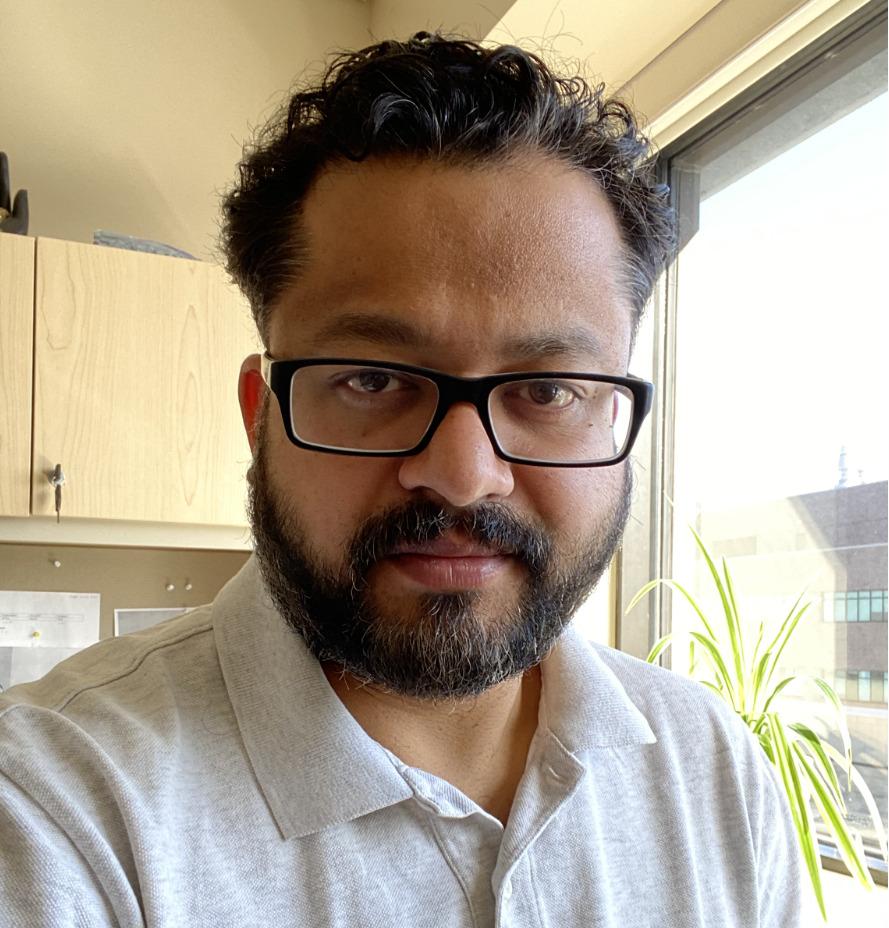Dr. Deepak Kaushik
Assistant Professor

Dr. Deepak Kaushik, Memorial University of Newfoundland
Dr. Deepak Kaushik is an Assistant Professor in the Division of Biomedical Sciences at the Memorial University of Newfoundland (MUN), St. John’s, Canada. Dr. Kaushik received a doctorate from the National Brain Research Centre, India, where he studied transcriptional regulation of microglia activation during inflammation. For his postdoctoral studies, he joined the laboratory of Dr. Wee Yong, a well-known neuroimmunologist working on understanding the pathology of multiple sclerosis (MS) at the University of Calgary, Canada. During his postdoctoral work, the focus of his investigation was to decipher the immunometabolic changes in myeloid cells during MS pathology. His findings identified that macrophages rely on glycolytic events for transmigration into MS brains. Dr. Kaushik’s continued interests in the field of immunometabolism defines his current stream of work. Using transgenic mice and high-throughput scRNA-seq platforms, his lab seeks to identify and investigate novel immunometabolic players in microglia and macrophages during early and progressive MS.
Learn more about Dr. Kaushik
What is the focus of your research? How did you become interested in MS research?
I am interested in identifying the mechanisms by which innate immune cells, macrophages and microglia, drive MS progression. These cells, like other immune cells such as T- and B-cells, have specialized energy requirements which are not well defined in MS. Using cell culture-based assays and transgenic mouse models, we are invested in identifying key signaling pathways (pertinent to metabolic states) that allow these cells to become pathogenic/non-reparative during MS progression.
During my graduate studies in India, my understanding of MS was limited and most of it came from published research articles and often from book chapters on ‘autoimmune conditions’. This was due to low prevalence of MS in that part of the world. Interestingly, there has been a sharp rise in MS cases in the Asia-Pacific region over the last decade, in part due to better diagnosis and perhaps due to changes in lifestyle factors. These observations, and my background in neuroimmunology, fuelled my interests to study this condition of the brain. I sought a postdoctoral position in the field of MS and one of my applications was to Dr. Yong, who offered me the position in his laboratory. And this was the beginning of my research career on understanding MS.
What inspires you to continue advancing research in this field?
Through the MS Society of Canada events, I have been fortunate to connect with several people living with MS and their caregivers. . I am always humbled by these experiences and the magnitude of belief they hold in researchers like me. It is this very faith and expectations that keeps me, and my research team motivated and inspired.
How do you hope to change the lives of people living with MS through your research?
The majority of existing disease-modifying therapies treat the relapsing-remitting form of MS. Treatment of progressive forms of MS remains a largely unmet need. Through my research on investigating metabolic signatures in immune cells during early and progressive phases of MS, I hope to identify key therapeutic targets for the treatment and management of progressive MS.
What do you enjoy most about your research? What are some of the challenges you face?
Learning new insights into a disease process is akin to putting different pieces of a puzzle together. I also enjoy teaching and sharing my knowledge with trainees. I am driven by the prospect of helping those that are affected by MS – it makes my research highly rewarding. The biggest challenge has been to start an independent research program at the peak of the COVID-19 pandemic, which has affected the progress of my lab.
How important is the support from the MS Society of Canada in your research?
Faced with covid-related challenges early in my independent career, the support I received from the MS Society of Canada comes as a ray of hope. This support puts me in a strong position to drive and expand the proposed projects. Interestingly, MS Society of Canada was the first granting agency to fund my postdoctoral fellowship and is also the first to fund my independent research. I am highly thankful for that.